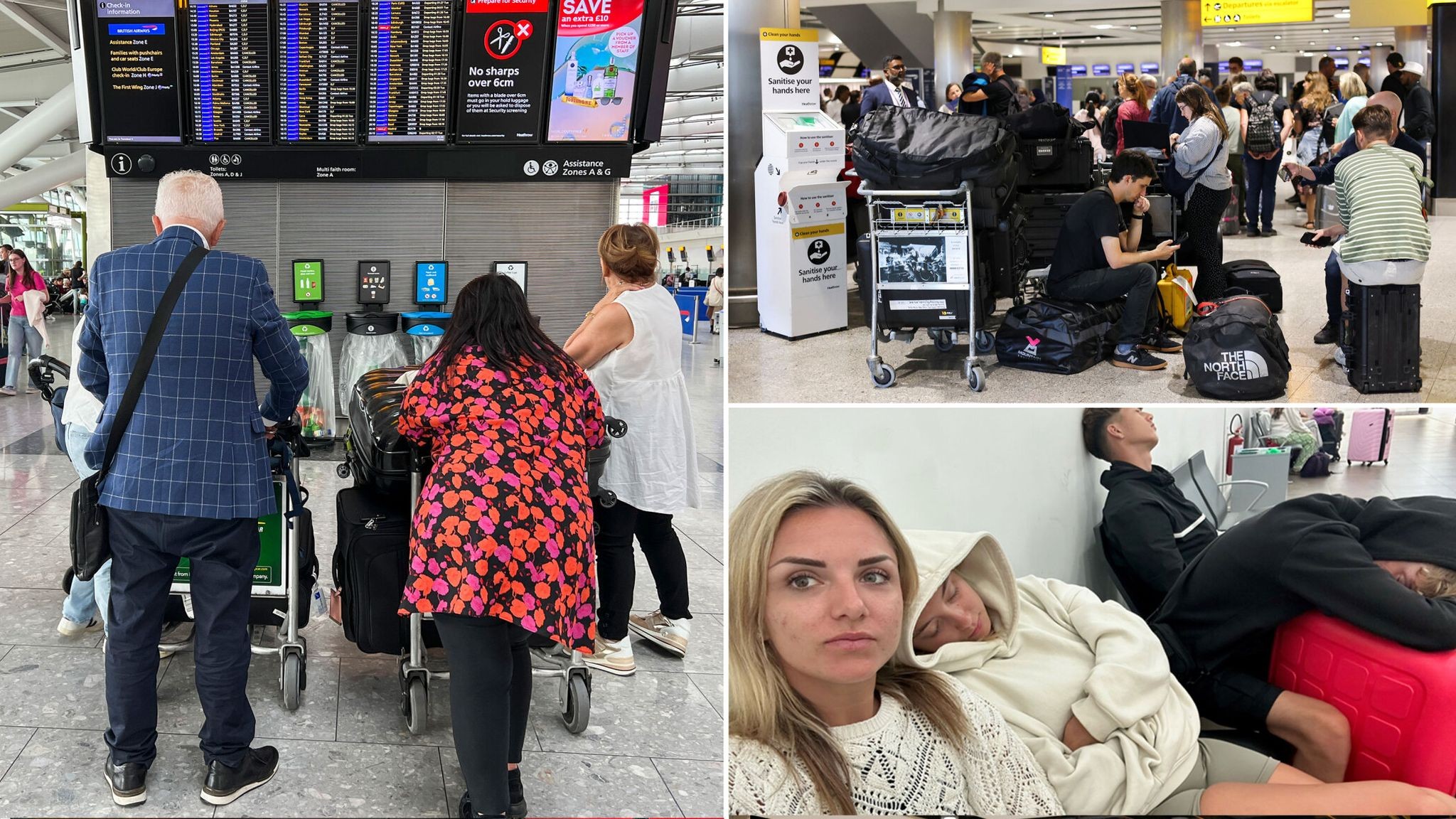Airports have warned disruption will continue into today despite the air traffic control glitch being fixed. Britons have told of sleeping on floors in European airports, with "fists flying" in Palma. Prime minister speaks out as delays and cancellations continue after Monday’s UK air traffic control failure.
Airlines should “take every possible step” to help passengers stranded and disrupted by the UK air traffic control failure, Downing Street says, as the fallout from Monday’s technical issue continued to cause widespread cancellations and delays.
About a quarter of million passengers were caught up in the bank holiday chaos when a technical problem at National Air Traffic Services (Nats), which runs UK air traffic control systems, severely limited take-offs and landings for about four hours. Almost 1,600 flights were cancelled across UK airports on Monday and a further 300 were cancelled on Tuesday morning, with many more delayed for several hours.
Some passengers overseas are unable to return home for several days, and Downing Street and ministers have told airlines to step up and fulfil their responsibilities to passengers. Rishi Sunak said: “I know people will be enormously frustrated by the disruption that’s impacting them. The transport secretary is in constant dialogue with all the industry participants, he will be talking to airlines specifically later today and making sure that they support passengers to get home as quickly as possible.”
The prime minister’s spokesperson said airlines had a responsibility to “get customers back to where they should be”, by either finding alternative travel for cancelled flights, or providing meals and accommodation until a flight departed.
Earlier, the transport secretary Mark Harper apologised for the disruption. He told the BBC: “Airlines have a responsibility either to get people back on a flight to get them home or to pay for them to be accommodated and to sort out accommodation of them, and for food or drink as well. If they don’t do it, people can pay for reasonable costs themselves and claim back from their airlines.”
Flight plans had to be input manually by controllers to allow air services to continue at all, while engineers struggled for almost four hours to find and fix the fault. Harper ruled out a cyber-attack as a possible cause, but said the aviation regulator would be conducting an independent inquiry. He said: “There was a technical issue with the flight planning system that will be looked at in detail.
When there is a significant issue like this … the CAA [Civil Aviation Authority] has to do a report on an incident of this magnitude and report back to me. “I don’t wish at this point to rush to judgment … they had to go to a manual system they have as a failsafe. Their primary responsibility is to make sure people fly safely, so they had to reduce the capacity of the system.”
Asked if this could have been caused by a cyber-attack, Harper said: “Those people who look at these things have looked at it and are clear it was not a cyber-attack. They will continue looking at the systems.” He added: “The timing was not at all helpful at all for people. The system is very busy anyway, but particularly on this bank holiday at the end of the holiday period … it is going to take some days to get completely everybody back to where they should be.”
Harper said he did not accept that the wider UK transport infrastructure could not be relied on. “On 99.9% of occasions, the air traffic system works perfectly well, millions of people fly into the UK without incident. Clearly, it was a big problem … I’m not minimising it … these things do not happen frequently.”
While there have been a series of IT problems over the years affecting passengers, the last major incident at Nats in Swanwick occurred in December 2014, when what was described as a computer glitch grounded flights for around an hour. Airlines including British Airways and TUI have predicted “significant delays” for passengers amid changes to schedules, with BA offering passengers travelling on Tuesday free rebooking should they wish to avoid the disruption. Heathrow airport and others urged passengers to confirm that their flight was still scheduled before leaving for the airport on Tuesday.
Gatwick said it planned to operate a normal schedule on Tuesday, but advised passengers to check the status of their flight. Most of the early morning flights operated by its major carrier, easyJet, departed several hours later than timetabled.
as you’re joining us today from Bangladesh, we have a small favour to ask. The Guardian has spent the past 13 years tirelessly investigating the shortcomings of the British Conservative government - austerity, Brexit, partygate, cronyism, the Liz Truss debacle and the individual failings of ministers who behave as if the rules don’t apply to them.
Our work has resulted in resignations, apologies and policy corrections. And with an election just round the corner, we won’t stop now. It’s crucial that we can all make informed decisions about who is best to lead the UK.









মন্তব্যসমূহ (০) কমেন্ট করতে ক্লিক করুন